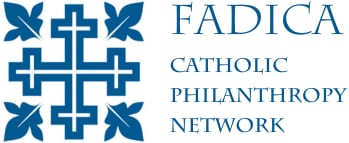Bonita Springs, FL – In his final address, retiring FADICA President Francis J. Butler told philanthropists gathered here for a national symposium commemorating the 50th anniversary of the Second Vatican Council, February 2-3, “Writing checks is important, but it can sometimes be the path of least resistance that avoids the real work—especially in service of a church that is hard-pressed to admit that it truly needs much more leadership and involvement from its laypeople.”
Dr. Butler spoke before some seventy foundation representatives and invited speakers gathered to take part in an exchange assessing the impact of the Council, especially on the giving programs of private foundations with interests in supporting church-related causes and institutions.
The theme of the assembly was: The Spirit of Renewal: Vatican II and the Future of Catholic Philanthropy.
The speakers included Cardinal Donald Wuerl, Archbishop of Washington, who spoke about new efforts launched by Pope Benedict to revitalize the Catholic faith, especially in the more developed countries of the world where Catholicism is showing signs of weakening religious knowledge and commitment among its younger members.
FADICA’s role in starting the national campaign to assist retired religious; its involvement with the Holy See in strengthening its internal financial auditing capacity; and its behind-the-scenes work to enable a national dialogue between the U.S. hierarchy and Catholic college and university presidents in the implementation of a Vatican-sponsored framework to reinforce the religious identity of Catholic institutions of higher learning, were among FADICA’s accomplishments which Dr. Butler lifted up as successful examples philanthropic collaboration with the church.
The FADICA group was formed in 1976 to help foster a better understanding of Vatican II among private philanthropists and to provide ongoing education about how Catholicism is retooling to carry out its mission.
Since that time, FADICA has grown in size and influence, developing from about a dozen foundations to over forty with combined endowments of over four billion dollars and joint annual giving approaching four hundred million dollars.
“Our ability to raise more funds for a given initiative was not…always the overriding reason that we combined our charitable giving for a particular cause,” said Dr. Butler. “We liked working together and we felt certain that a communal, institutional collaboration is essential to good philanthropy,” he said.
Dr. Butler spoke strongly in favor not only of grantmakers’ funding collaboration, but FADICA’s working partnerships with many church agencies including universities and national and international Catholic associations.
“Partnerships among Catholic organizations…can impact the church’s life in crucial ways, both locally—where traditional philanthropic interest usually begins and ends,” Dr. Butler asserted, “but also nationally and internationally as well.”
Dr. Francis J. Butler led the philanthropic association for thirty-one years, following work for the United States Conference of Catholic Bishops.
Sr. Katarina Schuth, OSF, a specialist in Catholic theological schools and professor at St. Paul Seminary in St. Paul, MN, one of eight presenters at the FADICA conference, thanked the members of FADICA for “reminding us of the good that results when creative people come together…to create a better future for the Church through their philanthropic activities… You have affected our lives and the lives of others touched by the ministry of the church.”
Also speaking at the conference were: Dr. Edward P. Hahnenberg of John Carroll University; Dr. Massimo Faggioli of the University of St. Thomas; Dr. Nicholas P. Cafardi, Dean Emeritus of Duquesne University; Dr. M. Cathleen Kaveny of the University of Notre Dame School of Law; Karen Rauenhorst of the Rauenhorst Family Foundation; and Rob Smith, Chair of the Carrie Estelle Doheny Foundation of Los Angeles.
An edited transcript of the proceedings of the conference, The Spirit of Renewal: Vatican II and the Future of Catholic Philanthropy, will available in the coming weeks through FADICA.


